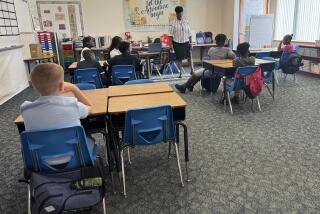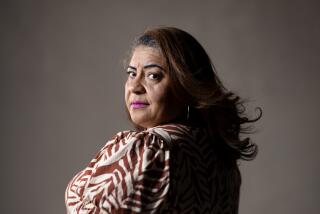Activist Courtney Everts Mykytyn, who challenged white parents to integrate schools, dies at 46
A Los Angeles mom who was troubled by the state of her neighborhood schools, Courtney Everts Mykytyn mobilized a local and then national effort that challenged white parents like herself to integrate schools assertively — and then resist the urge to take over.
Everts Mykytyn died Dec. 30 after she was struck by a car while standing near her Highland Park home talking to a neighbor, an apparent accident caused when a driver mistakenly hit the accelerator while attempting to park. She was 46.
Everts Mykytyn, who left high school without a diploma but went on to earn a doctorate, engaged in the painstaking work of winning over one white parent at a time, while also finding a way to partner with other constituencies. Her nonprofit, Integrated Schools, survived on her boundless volunteer efforts and those of other volunteers who’ve opened 19 chapters across the country.
“In a time when millions and millions were spent creating new charter schools and magnet programs for parents to feel comfortable sending their kids to public schools, Courtney asked parents to instead examine why they were uncomfortable in the first place,” said former L.A. school board president Steve Zimmer. “More than anyone else in L.A. over the past decade, Courtney moved parents from ‘I’d like to send my kid to my neighborhood school, but ...’ to ‘I am sending my kid to my neighborhood public school.’”
Everts Mykytyn began her own intellectual evolution as a new mom in her gentrifying Highland Park neighborhood. In playgrounds and grocery store lines, other white moms would talk about how the local schools were not the right fit for their children — filled with students from low-income minority families and recent immigrants. She began to see things differently and led a small group that sought to improve local schools by creating a high-quality, academic offering.
Working with school district officials, she and other parents were the driving force behind creating and sustaining a dual-language program, which paired English-only students with native Spanish speakers to make all students fully bilingual.
Their first try was at Yorkdale Elementary, which wasn’t receptive. The program instead took hold at Aldama Elementary, opening in 2008. Later, Everts Mykytyn was instrumental in developing a middle school follow-up program on the campus of nearby Franklin High School.
The Aldama effort was an important early spark for dual-language programs that have now expanded substantially across the nation’s second-largest school system.
Despite this success, there were critics who said such programs were frequently conceived as a way for the children of white parents to learn Spanish, with less attention focused on the needs of the participating Latino children.
Everts Mykytyn soon had her own misgivings as she watched white parents — her allies, friends and collaborators — interact with the school and the families of color who had preceded them on campus.
“It wasn’t about integration,” Everts Mykytyn said in a 2018 interview with the publication The 74. “It wasn’t about equity. It wasn’t about coming together as a community. It was entirely about, ‘This is really great, what I get for my kid. I’d like more.’ I don’t know how else to say it other than ‘opportunity hoarding.’”
Everts Mykytyn did not see enrolling in neighborhood schools as either a sacrifice or as merely a strategy for white children to benefit from diversity, but as part of a community building effort that would benefit all. She wanted to avoid the colonizing mind-set, where white parents would, for example, immediately insist on installing an organic garden.
Everts Mykytyn gradually developed ties with researchers, academics, thinkers, community leaders and like-minded parents. In 2015, this network became her L.A.-based nonprofit. Its Facebook group has about 2,000 followers and her podcasts on integration have been downloaded more than 70,000 times, said Stephan Blanford, the board chair of Integrated Schools.
“We were unapologetic about saying the problem of segregated schools is not a problem of black and brown folks but by and large of middle-class white folks and in many cases middle-class white women who for one reason or another have not lived up to the values they espouse,” said Blanford, who served recently as an elected director of the Seattle public school system.
Los Angeles parent Anna Lodder said she shared the mind-set of white moms in her neighborhood, including that her choice of school would make or break her children’s lives.
“I changed my mind after lots of two-hour conversations with Courtney,” she said.
Courtney Everts was born May 17, 1973, in Woodbridge, Va., the older of two children of an engineer and a homemaker. After her parents’ divorce, Courtney split her time and schooling between the East and West coasts.
She left North Hollywood High School early, got her her GED and worked various jobs in retail and restaurants while earning college credits. A mid-1990s brush with medicine as a volunteer led to a young emergency medical technician, Roman Mykytyn. They were married within a year.
He would move on to become a television editor. She completed her education at USC, earning a doctorate in 2008 in medical anthropology, looking at modern-day medical quackery, said Roman Mykytyn. Unable to find a tenure track position locally, she focused on raising her children, and ultimately, on where they’d be going to school.
Besides her husband, Everts Mykytyn is survived by two children who attend local public schools; her mother, J. Paulette Westphal, and her brother, Christof Ian Everts.
More to Read
Sign up for Essential California
The most important California stories and recommendations in your inbox every morning.
You may occasionally receive promotional content from the Los Angeles Times.











